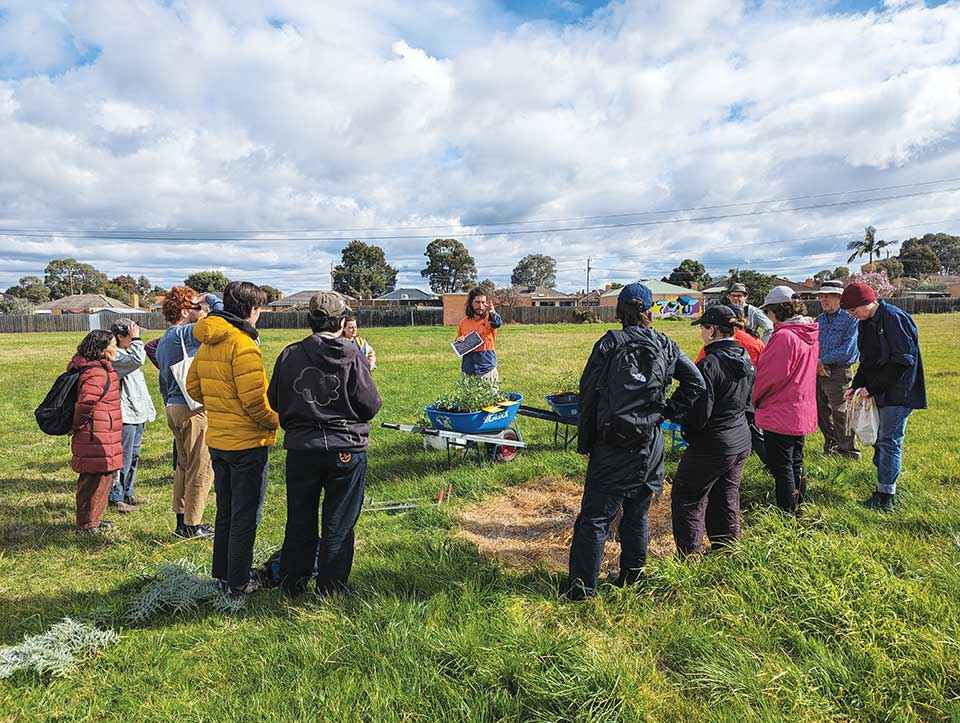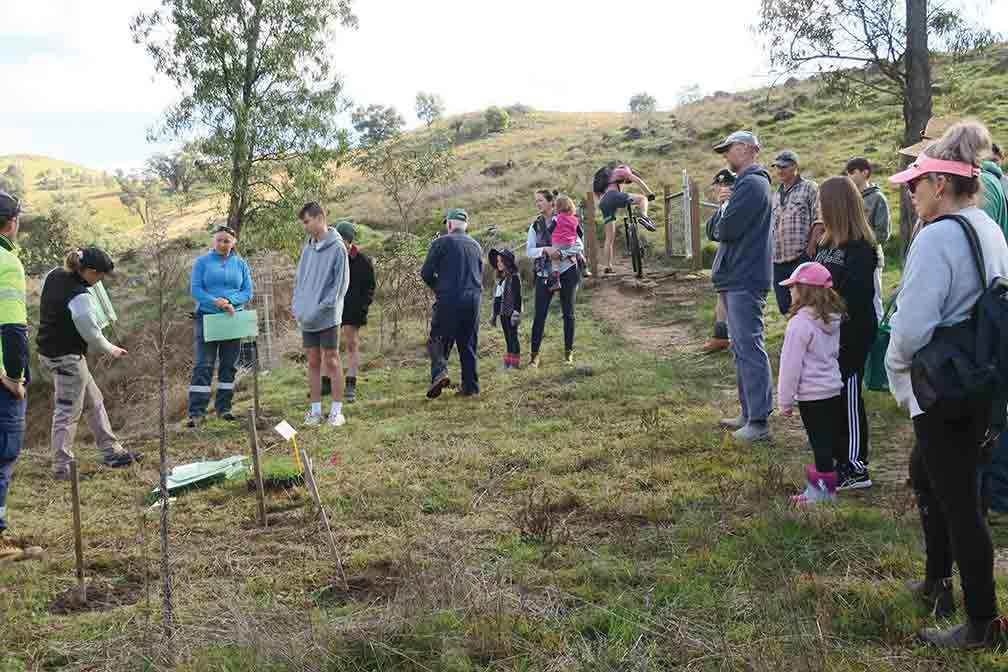Victorian Landcare Magazine - Winter 2024, Issue 87

From a weed-smothered drain, Merri Creek in Melbourne has been transformed into a much-loved waterway running through a picturesque bushland corridor, thanks largely to the efforts of the Merri Creek Management Committee (MCMC) and many volunteers over the past 35 years.
Established in 1989, MCMC has united people from various parts of the catchment to conserve biodiversity through initiatives such as restoration and repair projects, species monitoring, water quality assessments, community engagement and support, plantings, weeding and litter clean ups. MCMC works in partnership with its members, which include Darebin, Hume, Merri-bek, Whittlesea and Yarra City councils, Mitchell Shire Council, Friends of Merri Creek, and Wallan Environment Group, and alongside more than 20 ‘Friends of’ and citizen science groups.
A pioneer of urban creek protection, MCMC combines its ecologically sensitive restoration projects along Merri Creek and its tributaries with community education and specialist technical advice to volunteers, land managers and decision makers across an area of almost 400 square kilometres. MCMC takes a collaborative approach to its work of restoring the creek in complex urban, peri-urban and rural settings, by bringing together diverse perspectives from community, land managers, First Nations groups, government, and private landowners.”
Working with and supporting the community is a key focus. Activities include talks, training workshops, guided tours, weed removal events, litter collection, planting and direct seeding. The numbers are impressive. In 2021–2022, despite lingering COVID-19 restrictions, MCMC supported 1000 volunteers who contributed more than 3000 hours to habitat restoration and protection, when more than 6770 people took part in 333 events. Approximately 27,800 native grasses, shrubs and trees – including seed orchards for two rare species of banksia – were planted at some of the more than 80 sites along the creek and its tributaries.
Over a period of two years volunteers also collected 4.4 kilograms of seed from 43 different species for sowing. In 2022–2023, MCMC engaged with 332 volunteers in the upper Merri Creek catchment, and 319 participants contributed 641 hours across 20 events. The Tree Banksia Orchard at Fawkner was boosted by the planting of 500 seedlings to provide a convenient source of genetically diverse, climate adapted seed. MCMC has worked with 102 delivery partners and obtained funding from a range of sources, including local, state, and federal governments, as well as philanthropic grant programs and competitive tenders.
MCMC has partnered on a variety of community-led projects, including the Merri Paddle Roundtable, working with community specialists, local government, and experts from state government and academia, focused on bringing platypus back to Merri Creek. It also works with groups in the upper Merri, such as the Wallan Environment Group (WEG). MCMC is supporting WEG with its project to protect and enhance remnant vegetation along a disused rail reserve in Hidden Valley (Wallan), by undertaking a botanical survey of the site.
According to Merri Creek Management Committee Executive Officer Bernadette Thomas, robust community partnerships and collaboration have underpinned the success of its activities. This includes advocacy and bringing problems and solutions to the attention of local, state and federal governments, water corporations, not-for-profits and non-government organisations.
“The enduring theme over the 35 years is the strong community connection, and being part of the local – I say, local, because the creek’s 70-kilometres long – communities that live along the creek,” Bernadette said.
MCMC is constantly expanding support for new community groups, including the Queermates of Bababi Djinanang, and partnering with organisations from culturally and linguistically diverse communities.
Engagement with schools and scout groups has led to the formation of Junior Landcare groups at Upper Plenty Primary School
and Our Lady of the Way Primary School (Wallan). Wallan Scouts built and installed nest boxes along Wallan Creek, in Wallan Community Park with MCMC’s Landcare Facilitator, who in 2022 also helped set up the Upper Merri Plenty Catchments Landcare Group in the upper Merri.
“We are always keen to expand our work to partner with communities along the creek to help create that connection to nature that we know people are craving. It’s about harnessing some of their curiosity and seeing whether we can translate that into action and collaboration on restoration works and citizen science events,” Bernadette said.
Newham Primary School is located close to Hanging Rock and the Cobaw Biolink in the Macedon Ranges Shire. The school has been partnering with Newham and District Landcare Group since 2006 on biodiversity, revegetation, and environmental projects. The school has created an indigenous forest food garden, planted out a frog pond and revegetated a site adjacent to a tributary of Deep Creek for habitat and as an outdoor learning space. Thousands of native plants are being propagated at the school to enhance biodiversity in the local area. The partnership is increasing the environmental literacy of young people, creating connections within the community, and driving on-ground works.
Formed in 2012, Wodonga Urban Landcare Network (WULN) is helping change the face of its municipality by improving waterways, restoring bushland, encouraging the creation of habitat in backyards and across landscapes, and facilitating citizen science projects. Wodonga is one of the fastest growing municipalities in regional Victoria which places significant pressure on the natural environment and public green space. WULN has grown quickly from three to 16 member groups. WULN facilitates and supports new forms of Landcare including the Bhutanese community farm which supports local migrants to grow food sustainably and learn about the environment, the maintenance of a key tourist rail trail, the protection of endangered turtles and the operation of a native plant nursery. In the past two years, WULN member groups’ activities have involved 955 volunteers who contributed 18,631 hours to on-ground works.

Above: A community tree planting event at Klings Hill in 2023.